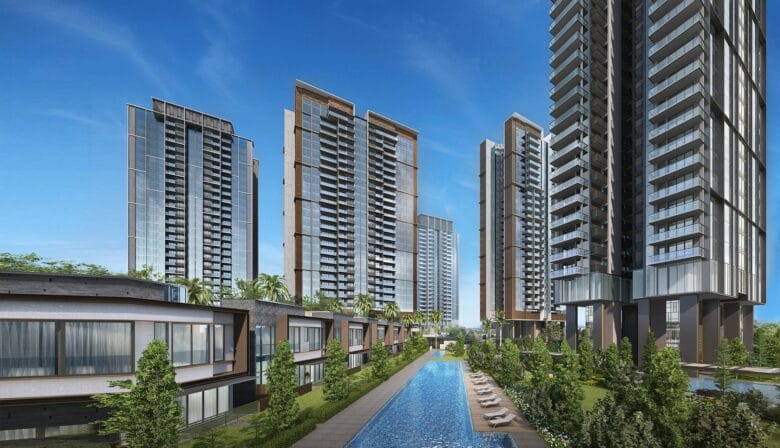
SingHaiyi Group’s 1,400-unit Parc Clematis was the largest project completed last year. (Image: SingHaiyi)
Singapore private residential rents fell 2.1 percent in the fourth quarter from the preceding three months, dropping for the first time since 2020, after developers completed more homes in 2023.
Ending 12 consecutive quarters of rental increases since a 0.5 percent decline in the third quarter of 2020, last quarter’s drop was the sharpest in more than 14 years, or since leasing rates plunged 5.2 percent in the second quarter of 2009, according to statistics from the Urban Redevelopment Authority (URA) on Friday.
The dip in rents wiped out the 0.8 percent uptick recorded in the third quarter and brought growth in leasing rates to 8.7 percent for the full year of 2023 after rents had spiked 29.7 percent in 2022. Analysts linked the downshift in rent growth to developers more than doubling the quantity of new homes completed in Singapore last year to a seven-year high of 19,968 units, with homebuyers then leasing out many of those properties.
“In a sign that the rental market has peaked, private residential rents fell… as landlords relaxed their rental expectations in view of higher competition,” said Wong Xian Yang, head of research for Singapore and Southeast Asia at Cushman & Wakefield. “With the increase in rental supply coupled with increasing tenants’ resistance, rents could see a mild fall in 2024, of up to 5 percent.”
Rents Climb 60% in 3 Years
The latest drop gives tenants some relief after rents had risen an average of 58.8 percent since the second quarter of 2020, according to URA statistics. CBRE’s head of research for Southeast Asia, Tricia Song, expects tenants can look forward to rental growth continuing to ease in the first half of 2024 as the market digests projects handed over last year.

URA chief executive officer Lim Eng Hwee
URA data shows that the luxury housing market was hit hardest last year with rents for landed properties, which include terrace houses, semi-detached homes, bungalows and shophouses, fell 4.1 percent in the fourth quarter from the preceding three months, reversing a 4.4 percent gain in the third quarter.
Rents of condos and apartments also declined in the October to December period, falling 1.8 percent from the end of the second quarter after climbing 0.2 percent in the preceding three months.
Contributing to last year’s supply surge was a surge of projects obtaining their temporary occupation permits. Three of the largest projects were the 1,468-unit Parc Clematis in Clementi, the 680-unit Sengkang Grand Residences in District 19 and City Developments Ltd’s 592-unit Amber Park luxury development on the East Coast.
“With the surge in new home completions, homeowners who were temporarily displaced due to construction delays can now exit the leasing market and move into their newly completed homes,” said Chia Siew Chuin, JLL’s head of residential research for Singapore. “Concurrently, prospective tenants now have the upper hand in lease negotiations on the back of an increase in leasing options.”
Chia expects rents for luxury homes to remain depressed for the first six months of the year against a challenging macroeconomic backdrop and elevated supply levels, while the mass market may post soft rental growth. She expects residential rents across the market to rise by up to 3 percent for the year.
Home Prices To Ease Further
The URA’s final figures for sales of new private homes sales show prices rose slightly faster than initially estimated, notching a 2.8 percent increase in the fourth quarter, compared to flash figures announced earlier in the month which had estimated growth at 2.7 percent.
Final figures for full-year 2023 home price growth registered 6.8 percent, up from flash estimates of a 6.7 percent increase, but still lower than the 8.6 percent surge in 2022 and 2021’s 10.6 percent jump.
Singapore’s slower home price growth coincides with a 9.6 percent drop in private home sales in 2023, with buyers picking up a 15-year low of 6,421 units, compared with 7,099 in 2022.
Home prices are expected to moderate this year as more housing flows into the market, with JLL estimating that developers will launch over 12,000 units this year.
“We expect a soft landing for the residential market as the price and rental growth should moderate in 2024 but not crash. Prices are unlikely to correct significantly due to resilient household balance sheets and low unsold inventory,” said CBRE’s Song.
Cushman and Wakefield predicts home prices will rise by up to 3 percent this year while JLL expects up to a 5 percent increase.
Leave a Reply